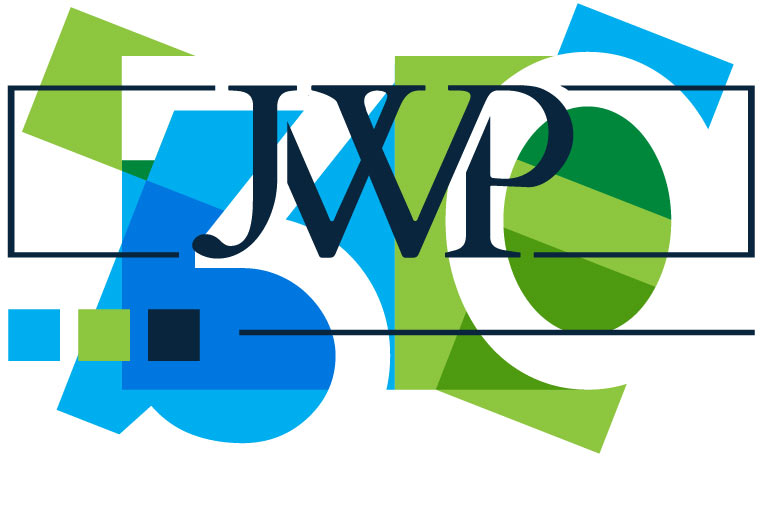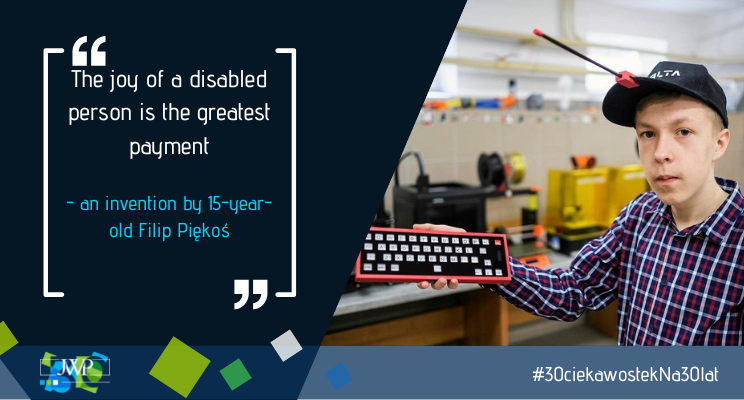Filip, aged 15, who has been working for a year to develop a keyboard that can help disabled people, is now awaiting the decision of the Polish Patent Office.
“The application has been filed, we are currently waiting for the state-of-the-art report, the publication of the application information and, finally, the decision on granting the patent”, says Piotr Mierzwiński, patent attorney at JWP Patent & Trademark Attorneys, who handled the case pro bono on behalf of the JWP Foundation.
Meet the 15-year-old inventor; his dad, Bogusław Piękoś, talks about Filip, his interests and new inventions.
What is Filip interested in? What are his passions?
He is mainly interested in everything that is related to computers. He reads and programs a lot. His passion is assembling small programmable devices. Actually, this is how his invention came about – he decided to construct a programmable keyboard for himself.
Apart from that he is currently working on a smart home. He loves Morgan Freeman. He enjoys computer games as much as anyone else, but doesn’t overdo it; he mainly plays in a team with his siblings. It helps him relax.
In your opinion, what are the most important features of the solution submitted to the Polish Patent Office?
The use of magnetic sensors as switches in the keyboard, with a pointer to activate them, which can come in different forms. This solution may help a lot of disabled people to be able to work on a computer.
Has anyone used this invention yet? And if so, what are their first impressions?
The ZHELTA K6 programmable keyboard without magnetic sensors was first used by Filip’s classmates. It makes it much easier for them to play computer games, apparently.
More recently, following a meeting with a disabled person who has only one functioning hand with a very small range of movement, the pointer has been adapted to fit the user’s grip and a stand has been added to the ZHELTA K46 keyboard, allowing it to be tilted.
The indescribable joy of the disabled person is the biggest payoff for the handover and installation of the keyboard at their home. It is almost like a new chapter opening up in their life. The keyboard is not just for typing, but for the most common activities, too. Everything has been programmed specifically to suit their requirements.
A lot of other disabled people are approaching us and meetings with them inspire further modifications to the invention.
Have any large companies or institutions expressed interest in the invention?
The meetings we had at a conference attended by the heads of local centres for the disabled gave us a broader perspective and prompted us to think about new ways to help such people, open a window to the wider world for them, so to speak.
Many disabled people around the world are offered euthanasia because of their ailments. If Filip’s invention saves the life of even one such person, it will be a great achievement… We just need to reach them. It requires take time and publicity.
Has no one actually invented such a solution yet?
It seems so. No one is selling such contactless keyboards.
Apparently, there was an attempt to take over the idea. What happened? And how was it stopped?
There was an attempt to get a sneak peek at how the keyboard, i.e. the actuator, works. Several recognized and talented engineers looked closely at a working ZHELTA K6 keyboard and came up with nothing. Probably none of them suspected such a simple solution. Just in case, I sent a letter warning them that it was Filip’s intellectual property.
And how did you come across the JWP Foundation?
Through Filip’s secondary school in Jarosław, thanks to Mr. Adam Tomaszewski, the headmaster, and Mr. Artur Tutka, one of the teachers. The JWP Foundation takes part in the educational project called “Intellectual Property at Your School” organized by the Polish Patent Office.
What are your thoughts after getting to know the patent procedure better and witnessing the first application?
All of this would have been difficult to accomplish on our own. It’s like with a court case: one needs an expert. We were fortunate to meet the exceptional Mr. Piotr Mierzwiński at the JWP Foundation. No words could express the extent of what he did to help Filip. He worked out every detail, asked about every single document and made sure everything was in order.
Is Filip working on any new projects?
Of course. For now, modifications to the existing keyboard designs have the highest priority. But he is also working on other projects, such as a life-saving device for people in the mountains, whose prototype will be developed soon.
What are Filip’s plans education-wise?
Right now his plans are not very far-fetched. He is taking one step at a time. First, he wants to study at the Rzeszow University of Technology.

